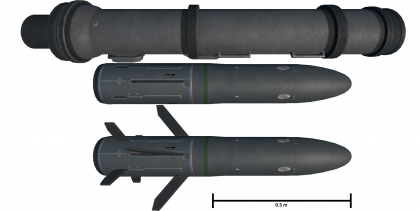Difference between revisions of "Rbs 56"
(Edits) |
(→General info: add table) |
||
| Line 17: | Line 17: | ||
== General info == | == General info == | ||
| − | ''Tell us about the tactical and technical characteristics of the missile.'' | + | <!--''Tell us about the tactical and technical characteristics of the missile.''--> |
| + | {| class="wikitable" style="text-align:center" | ||
| + | ! colspan="2" | Missile characteristics | ||
| + | |- | ||
| + | | '''Type''' || Top-Down | ||
| + | |- | ||
| + | | '''Calibre''' || 150 mm | ||
| + | |- | ||
| + | | '''Mass''' || 10.9 kg | ||
| + | |- | ||
| + | | '''Guidance''' || Semi-Automatic (SACLOS) | ||
| + | |- | ||
| + | | '''Maximum speed''' || 250 m/s | ||
| + | |- | ||
| + | | '''Missile guidance time''' || 15 secs | ||
| + | |- | ||
| + | | '''Firing range''' || 2.2 km | ||
| + | |- | ||
| + | | '''Explosive mass''' || 2.72 kg TNTeq | ||
| + | |- | ||
| + | | '''Fuze delay''' || 0.05 m | ||
| + | |- | ||
| + | | '''Fuze Sensitivity''' || 0.1 mm | ||
| + | |- | ||
| + | | '''Arming distance''' || 10 m | ||
| + | |- | ||
| + | | '''Trigger radius''' || 3 m | ||
| + | |- | ||
| + | | '''Armour penetration''' || 510 mm | ||
| + | |} | ||
=== Effective damage === | === Effective damage === | ||
Revision as of 12:37, 5 June 2022
Contents
Description
The Robotsystem 56 "BILL" (Rbs 56) is a Swedish medium range anti-tank weapon system designed by Bofors (Now SAAB Bofors Dynamics) under the name "BILL" (Bofors Infantry Light and Lethal anti-tank missile). Development started in 1979, was first demonstrated in 1982 and brought into service in 1985. The Rbs 56 served as a man-portable anti-tank weapon designed to destroy enemy MBTs (Main Battle Tank) up until 2013 after which it was replaced by the newer Rbs 57 "NLAW".
The Rbs 56 is an OTA (Over-fly Top Attack), SACLOS (Semi-automatic command to line of sight) wire-guided anti-tank missile system. The weapon, like most anti-tank guided missiles, uses a warhead that perforates armour using an explosively formed penetrator (EFP), a type of warhead often referred to as "HEAT" (High Explosive Anti-Tank). What differentiates the Rbs 56 from most similar weapon-systems is the fact that the warhead is facing downwards at a 30 degree angle and located further back onto the missile.
The warhead location and orientation is due to the fact that the Rbs 56 defeats targets using the mentioned "OTA" method, which means that instead of the missile detonating on impact and sending the penetrator horizontally into the target it instead flies over and detonates vertically sending the penetrators downwards into less protected areas.
The only vehicle currently using the Rbs 56 is the Strf 9040 BILL which uses the upgraded Rbs 56B "BILL 2".
Vehicles equipped with this weapon
General info
| Missile characteristics | |
|---|---|
| Type | Top-Down |
| Calibre | 150 mm |
| Mass | 10.9 kg |
| Guidance | Semi-Automatic (SACLOS) |
| Maximum speed | 250 m/s |
| Missile guidance time | 15 secs |
| Firing range | 2.2 km |
| Explosive mass | 2.72 kg TNTeq |
| Fuze delay | 0.05 m |
| Fuze Sensitivity | 0.1 mm |
| Arming distance | 10 m |
| Trigger radius | 3 m |
| Armour penetration | 510 mm |
Effective damage
Describe the type of damage produced by this type of missile (high explosive, splash damage, etc)
Comparison with analogues
Give a comparative description of missiles that have firepower equal to this weapon.
Usage in battles
This missile can defeat most MBTs and IFVs. It can strike through ERA and works better on vehicles with a carousel auto-loader or vehicles that stow ammunition centre-mass. Very effective at low to medium range, still being effective at long range but limited due to the velocity of the missile.
Pros and cons
Pros:
- Attacks vehicles where the armour is the thinnest
- Can attack hull-down vehicles
- Good manoeuvrability
- Excellent penetration, often knocking a vehicle out in one strike
- Lightweight
- Decent range
Cons:
- A direct nose impact won't cause any significant damage
- Can be difficult to anticipate exactly where to aim on moving targets
- Lower velocity and range than the TOW-2B
History
Examine the history of the creation and combat usage of the weapon in more detail than in the introduction. If the historical reference turns out to be too long, take it to a separate article, taking a link to the article about the weapon and adding a block "/History" (example: https://wiki.warthunder.com/(Weapon-name)/History) and add a link to it here using the main template. Be sure to reference text and sources by using <ref></ref>, as well as adding them at the end of the article with <references />.
Media
- Videos
See also
Links to the articles on the War Thunder Wiki that you think will be useful for the reader, for example:
- reference to the article about the variant of the weapon;
- references to approximate analogues by other nations and research trees.
External links
Paste links to sources and external resources, such as:
- topic on the official game forum;
- encyclopedia page on the weapon;
- other literature.




